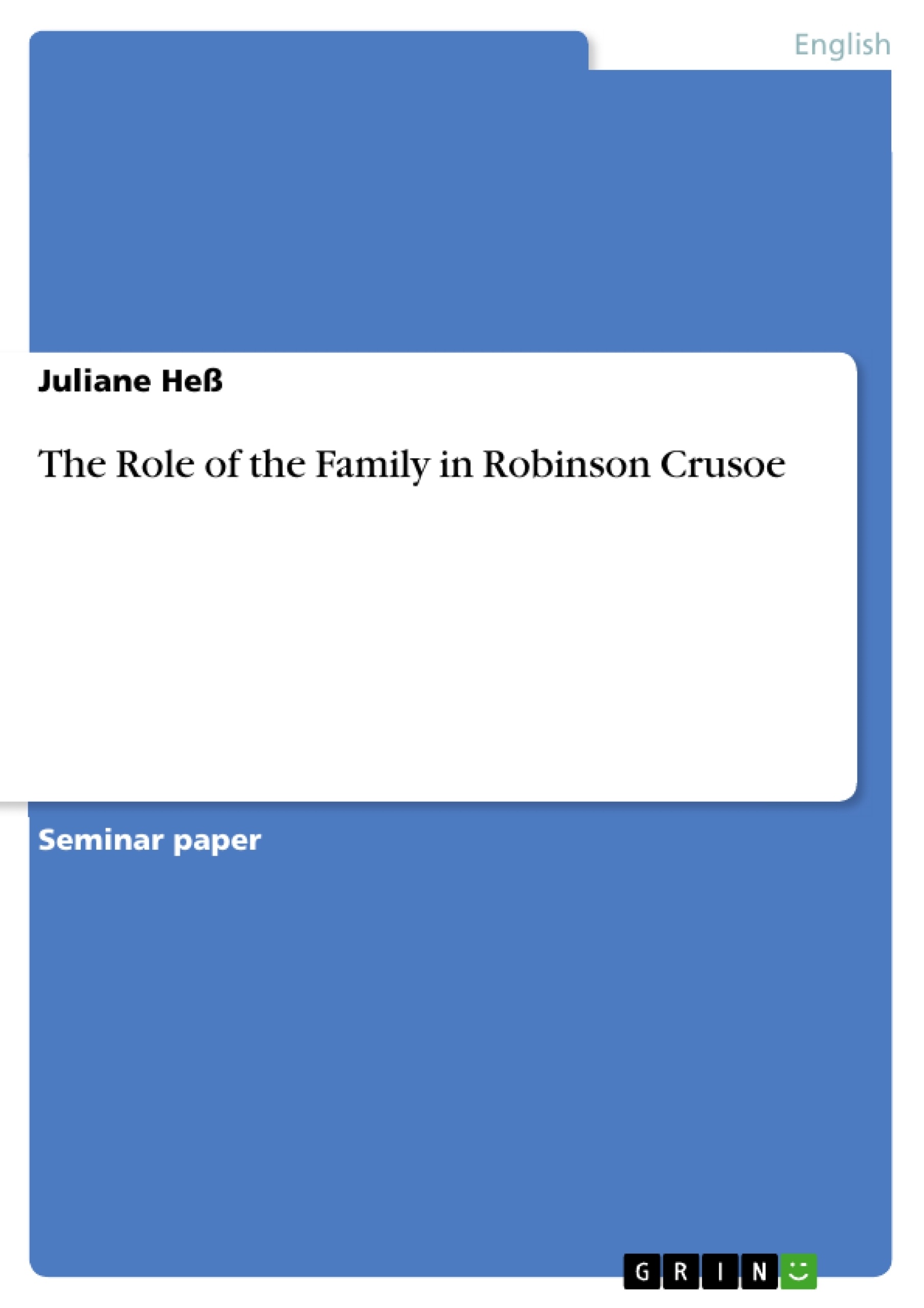Robinson Crusoe, written by Daniel Defoe, is one of the most read books in the world. There are numerous reasons for this success. Some people love the adventure story of Robinson who lives on a deserted island, far away from everyday life, which seems really desirable for the modern society. Others admire Robinson as the self-made man who is on his own in an uncivilized area and manages his life independently for so many years. That is why the story is often interpreted as an old form of the American Dream. It can also be seen as a religious story because of the importance of God in it. There are many more ways of reading the novel Robinson Crusoe and a lot of different themes that can be focused on, even though some are not apparently important for the development of Crusoe´s adventurous story...
Inhaltsverzeichnis (Table of Contents)
- 1. Introduction
- 2. What is a Family?
- 3. Robinson Crusoe's Family
- 3.1 Crusoe introduces his Family
- 3.2 Crusoe's Father as the Foreigner
- 3.2.1 The True born Englishman
- 3.3 Changing Names
- 4. The undesired convenient Life
- 4.1 Designed for the Law
- 4.2 Going away
- 4.3 The upper Station of low Life
- 5. The Reasons for Crusoe's Flight
- 5.1 Who is to blame for his Escape?
- 6. Crusoe as the disobedient Son
- 6.1 Empathy versus Wanderlust
- 6.2 The Prophecy to his Perdition
- 6.3 The original Sin
- 6.4 The Prodigal Son
- 7. Replacing the Family?
- 7.1 Omitting the Family
- 7.2 'Building me a Home'
- 7.3 The Substitution of his Family
- 8. The Role of Women in Robinson Crusoe
Zielsetzung und Themenschwerpunkte (Objectives and Key Themes)
This term paper aims to explore the influence of family dynamics on the life and actions of the protagonist in Daniel Defoe's novel "Robinson Crusoe." While the protagonist's family is only present in the initial pages of the book, their impact on his decisions and his eventual fate is significant.
- The complicated relationship between Crusoe and his father, particularly the father's inability to convince his son to follow a conventional path.
- The reasons behind Crusoe's rebellious escape from his family and its implications on his later experiences.
- The contrasting nature of Crusoe's life before and after his escape, comparing the constraints of family life to his newfound independence on the island.
- The development of alternative family structures for Crusoe on the island, particularly his relationship with Friday.
- The potential parallels between the family background of Daniel Defoe and that of his protagonist, exploring the autobiographical aspects of the novel.
Zusammenfassung der Kapitel (Chapter Summaries)
The first chapter provides an introduction to the novel "Robinson Crusoe," highlighting its enduring popularity and exploring various themes, including the American Dream and religious interpretations. The second chapter delves into the definition of "family," examining the different perspectives on family structure and its evolution throughout history, particularly in the 18th century. The third chapter introduces Robinson Crusoe's family, focusing on the initial description of his family background and his own limited emotional connection to them. The fourth chapter explores the reasons for Crusoe's desire to escape the conventional life his family intended for him, highlighting his rejection of the predetermined path. The fifth chapter delves into the complexities of Crusoe's relationship with his father, particularly the father's inability to persuade his son to stay home and follow his guidance. The sixth chapter explores the consequences of Crusoe's disobedience, examining the themes of empathy, wanderlust, and the idea of a prophesied perdition.
Schlüsselwörter (Keywords)
Key terms and themes explored in this work include family dynamics, parental influence, filial disobedience, escape from societal norms, self-reliance, the role of religion, the impact of colonialism, and the development of alternative family structures within a solitary environment.
- Citation du texte
- Juliane Heß (Auteur), 2009, The Role of the Family in Robinson Crusoe, Munich, GRIN Verlag, https://www.grin.com/document/177684



